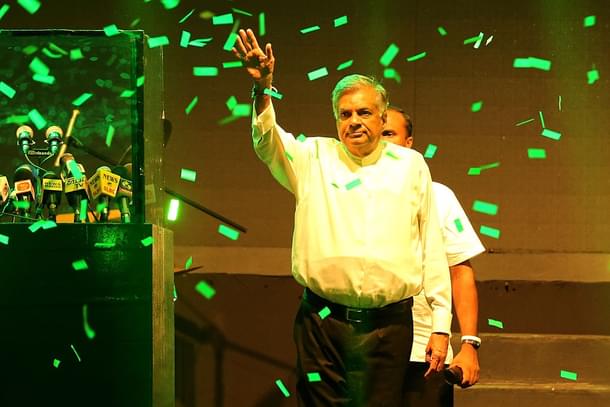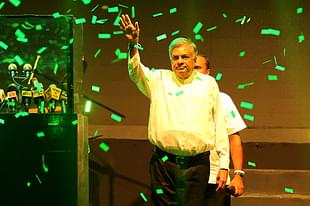Context
Ranil Wickremesinghe Elected New President Of Crisis-Hit Sri Lanka
Ujjawal Mishra
Jul 20, 2022, 03:40 PM | Updated 03:42 PM IST
Save & read from anywhere!
Bookmark stories for easy access on any device or the Swarajya app.


Six-time prime minister and acting President Ranil Wickremesinghe was elected the new President of Sri Lanka in a secret ballot on 20 July.
Context: After the fleeing of former president Gotabaya Rajapaksa and his subsequent resignation, an election was held in the wake of the simmering tensions triggered by the unprecedented economic and political crisis in Sri Lanka.
The new President will have a mandate to serve out the rest of Rajapaksa’s term, which ends in November 2024.
The election: Ranil Wickremesinghe secured 134 votes in the 225-member House, while his nearest rival and opposition leader Dullas Alahapperuma got 82 votes.
Leftist Janatha Vimukthi Peramuna leader Anura Kumara Dissanayake secured three votes.
Voting was held by a secret ballot amid tight security where 223 lawmakers voted while two MPs abstained.
Four votes were rejected while 219 were declared valid.
Going against convention: For the first time in 44 years, Sri Lanka's Parliament has directly elected a president.
Presidential elections in 1982, 1988, 1994, 1999, 2005, 2010, 2015, and 2019 had elected a president by popular vote.
The previous occasion when the presidency became vacant mid-term was in 1993 when president Ranasinghe Premadasa was assassinated.
The Sri Lankan crisis was a perfect storm where issues hurting the population coupled with disenchantment with the political leadership came together.
Ultimately came protests, which led to the occupation of the presidential compound and Gotabaya Rajapaksa's fleeing to the Maldives and then to Singapore.
From Singapore, he sent his resignation to the speaker of Sri Lanka's Parliament.
What led to this: Several factors were at play.
Issues like inflation, food shortage, and power outages
As the government banned fertilisers and herbicides, food production dropped significantly, which led to farmers' protests.
Successive Sri Lankan governments were living beyond their means and employing a debt rollover strategy to keep the country afloat. The country, therefore, now owes between $5 billion and $10 billion to China, and its overall debt stands at $51 billion.
Covid-19 severely affected tourism and contributed to a balance of payments crisis. In other words, the country was unable to pay for essential imports or service its debt.
The government couldn’t pay for almost anything it was hoping to import, leading to shortages in medicines and milk powder.
The government announced that it would provide fuel for essential services only, shuttering schools and ordering workers to stay at home.
Sri Lanka's 75 per cent Sinhalese population was given preferential treatment, which led to disenchantment among other communities.
Sri Lanka has ended up with a system that disregards merit and is instead rooted in enthnocracy — rule by one dominant group. And that has helped spread nepotism and corruption.
After the civil war, the Rajapaksas looked to develop the country by building up infrastructure. What the country got was “blingfrastructure” — vanity projects, often financed by China, which were dogged by corruption and graft like the Mattala Rajapaksa International Airport that is hardly in use.
Reassurance: The new president is striking a hopeful note as he distances himself from the disgraced administration of his predecessor.
Wickremesinghe has promised Sri Lankans that the country's economy will be in a better shape by next year.
"We have gone back. We have to pull ourselves up by the bootstraps. We don't need five years or 10 years. By the end of next year let's start stabilising, and certainly by 2024 let's have a functioning economy which will start growing,” he said prior to his election.
Respite awaited: Sri Lanka is nowhere close to being out of trouble just yet. The new president will have to bring in political stability while working with partners like India, the US, China, as well as global agencies like the IMF.




